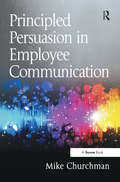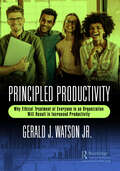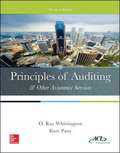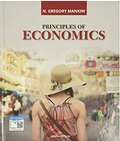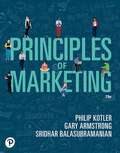- Table View
- List View
Principios que funcionan: En la vida y el liderazgo
by Colin PowellEste libro es una colección de lecciones y anécdotas personales que han formado la carrera en el servicio público del general de cuatro estrellas y anterior Secretario de Estado Colin Powell. En el corazón de este libro se encuentran las «13 reglas», notas que él ha acumulado en su escritorio, y ahora son base de sus presentaciones de liderazgo en todo el mundo. Las reglas cortas y sencillas de Powell como «enójate y luego supéralo» y «comparte crédito» salen a la luz al revelar historias personales que presentan y amplían sus principios para el liderazgo efectivo: convicción, trabajo duro, y sobre todo, respeto por otros. En el trabajo y en la vida, Powell escribe «es el gesto humano lo que cuenta». Una convincente narrador, Powell comparte las parábolas tanto humorísticas como solemnes que ofrecen sabios consejos sobre cómo triunfar en el lugar de trabajo y más allá. «Confía en tu gente», aconseja mientras delega pequeñas responsabilidades presidenciales a dos ayudantes principiantes. «Haz lo mejor alguien está viendo», les aconseja a aquellos que recién están comenzando, al recordar su propio trabajo de verano cuando era adolescente enviando cajas de soda. Powell combina el conocimiento que ha ganado al servir en los altos rangos de la milicia y en cuatro administraciones presidenciales, así como también las lecciones aprendidas de una crianza difícil en el Bronx y su entrenamiento en ROTC. El resultado es un retrato poderoso de un líder que es prudente, modesto y agradecido por las contribuciones de cada una de las personas con las que trabaja. Este libro de Colin Powell está hecho para inspirar, conmover y sorprender a los lectores. Profundo y revelador, es un brillante y original modelo de liderazgo.
Principled Persuasion in Employee Communication
by Mike ChurchmanPrincipled Persuasion in Employee Communication highlights a new but significant dilemma for organisational leaders. Will they continue on the same track that, since the nineteenth century, has led them to exert increasing control over their employees? Or will they take another path, one that leads towards a new type of working environment where the culture encourages freedom of communication and movement? This book argues for an approach to employee communication that sets out to liberate employees from the stifling constraints that organisations continue to impose on them. Principled Persuasion is so-called because it uses persuasive techniques, based on clear principles, to create new, forward-looking organisational cultures. It sets out to increase employee happiness and minimise the harms done to employees at work. It grounds itself on a strong ethical base composed of fundamental, universal principles. It introduces a new approach to the use of language, not only calling for more clarity and meaning in organisational communication, but also for a more conscious use of rhetorical techniques to change vocabulary, metaphors and internal dialogue for the better. Make no mistake, most organisations have totally underrated the strategic importance of employee communication. Principled Persuaders understand that the key to dealing with the unpredictable events about to unfold in the twenty-first century will be a new way of communicating with the workforce. The flexibility, adaptability and innovation that will be needed to survive and prosper in coming decades can only be achieved by liberating employees, not imprisoning them further in established systems and processes.
Principled Productivity: Why Ethical Treatment of Everyone in an Organization Will Result in Increased Productivity
by Gerald J. Watson Jr.This book demonstrates that ethical treatment of everyone in an organization: 1. Will increase productivity in all the functional activities of the organization as well as its members. 2. Will ensure the growth of the organization as a result of continuous improvements that may have been initiated by management but will be continuously improved by motivated employees. It achieves this by: 1. The presentation of examples from personal experience and a review of the literature. 2. Providing a list of critical questions for each function whose correct solutions will provide a metric that enables and establishes obtainable goals for improvement. This book is unique because it requires the decision-maker to examine each potential decision and ask the questions: 1. Do alternative methods exist that will achieve the desired goals, which will minimize the long-term adverse effects on affected employees and the future viability of the organization? 2. When is the appropriate time to implement this decision? 3. What is the best way to implement this decision? The decision may involve a reduction in force (RIF), a potential change in a vendor or a manufacturing process, the formation of a safety team, and/or the installation or modification of an incentive system. The decisions could be involved in manufacturing, logistics, quality, or healthcare. This work will benefit everyone in leadership positions in all branches of government, manufacturing, logistics, human relations, and healthcare, especially those working with frontline employees, staff, and customers.
Principles & Practices of New Jersey Real Estate (19th Edition)
by Frank W. Frank W. KovatsThe economic importance of real estate today demands a higher professional level for all persons dealing in real estate, with an increased emphasis on educational requirements. Also, every state requires that a person engaging professionally in the real estate business, either as a broker or as a salesperson, must be licensed, and in each case, a state examination is a prerequisite for a license. Principles and Practices of New Jersey Real Estate has been written to serve as an educational guide for students and for persons desiring to take New Jersey's real estate licensing examination, as a quick reference for those already in the profession, and for use by the many other professionals dealing with various aspects of real estate.
Principles Of Agricultural Economics
by Paul W. Barkley Andrew BarkleyThis book showcases the power of economic principles to explain and predict issues and current events in the food, agricultural, agribusiness, international trade, natural resources and other sectors. The result is an agricultural economics textbook that provides students and instructors with a clear, up-to-date, and straightforward approach to learning how a market-based economy functions, and how to use simple economic principles for improved decision making. While the primary focus of the book is on microeconomic aspects, agricultural economics has expanded over recent decades to include issues of macroeconomics, international trade, agribusiness, environmental economics, natural resources, and international development. Hence, these topics are also provided with significant coverage.
Principles Of Auditing And Other Assurance Services
by Ray O. Whittington Kurt PanyThe 20th edition of Principles of Auditing & Other Assurance Services provides a carefully balanced presentation of auditing theory and practice. Written in a clear and understandable manner, it is particularly appropriate for students who have had limited or no audit experience. The approach is to integrate auditing material with that of previous accounting financial, managerial, and systems courses.
Principles Of Economic Sociology
by Richard SwedbergThe last fifteen years have witnessed an explosion in the popularity, creativity, and productiveness of economic sociology, an approach that traces its roots back to Max Weber. This important new text offers a comprehensive and up-to-date overview of economic sociology. It also advances the field theoretically by highlighting, in one analysis, the crucial economic roles of both interests and social relations. Richard Swedberg describes the field's critical insights into economic life, giving particular attention to the effects of culture on economic phenomena and the ways that economic actions are embedded in social structures. He examines the full range of economic institutions and explicates the relationship of the economy to politics, law, culture, and gender. Swedberg notes that sociologists too often fail to properly emphasize the role that self-interested behavior plays in economic decisions, while economists frequently underestimate the importance of social relations. Thus, he argues that the next major task for economic sociology is to develop a theoretical and empirical understanding of how interests and social relations work in combination to affect economic action. Written by an author whose name is synonymous with economic sociology, this text constitutes a sorely needed advanced synthesis--and a blueprint for the future of this burgeoning field.
Principles Of Economics (Mindtap Course List Ser.)
by N. Gregory MankiwNow you can master the principles of economics with the help of the most popular economics textbook trusted by students worldwide -- Mankiw�s PRINCIPLES OF ECONOMICS, 9E. Using a clear, inviting writing style, this book emphasizes only the material that helps you better understand the world and economy in which you live. You learn to become a more astute participant in today's economy with a strong understanding of both the potential and limits of economic policy. The latest relevant examples bring economic principles to life. Acclaimed author Gregory Mankiw explains, "I tried to put myself in the position of someone seeing economics for the first time. My goal is to emphasize the material that students should and do find interesting about the study of the economy." To help you further master the key principles of economics in this edition, powerful student-focused digital resources are available in the leading MindTap digital learning and homework solution.
Principles Of Economics 7th Edition
by N. Gregory MankiwWith its clear and engaging writing style, PRINCIPLES OF ECONOMICS, Seventh Edition, continues to be one of the most popular books on economics available today. Mankiw emphasizes material that you are likely to find interesting about the economy (particularly if you are studying economics for the first time), including real-life scenarios, useful facts, and the many ways economic concepts play a role in the decisions you make every day.
Principles Of Macroeconomics
by Robert H. Frank Ben S. Bernanke Kate Antonovics Ori HeffetzPrinciples of Macroeconomics, 7th Edition, provides a deeper understanding of economics by eliminating overwhelming detail and focusing on seven core principles that are reinforced and illustrated through the text. <P><P> With engaging questions, explanations and exercises, the authors help students relate economic principles to a host of everyday experiences such as going to the ATM or purchasing airline tickets. Throughout this process, the authors encourage students to become "economic naturalists:" people who employ basic economic principles to understand and explain what they observe in the world around them. <P><P> With new videos and interactive graphs alongside SmartBook's adaptive reading experience, the 7th edition enables instructors to spend class time engaging, facilitating, and answering questions instead of lecturing on the basics.
Principles Of Macroeconomics
by Dirk Mateer Lee CoppockAn innovative instructor uses his tested insights and successful teaching practices to create a truly student-centered approach: real-world examples, pedagogy developed in his own classrooms, and problem solving tools that resonate with today's students.
Principles Of Macroeconomics (Sixth Edition)
by Robert H. Frank Ben S. Bernanke Ori Heffetz Kate L. AntonovicsProfessor Antonovics received her B.A. from Brown University in 1993 and her Ph.D. in economics from the University of Wisconsin in 2000. Shortly thereafter, she joined the faculty in the Economics Department at the University of California, San Diego, where she has been ever since.
Principles Of Marketing
by Gary Armstrong Philip T. KotlerIn a fast-changing, increasingly digital and social marketplace, it's more vital than ever for marketers to develop meaningful connections with their customers. Principles of Marketing helps readers master today's key marketing challenge: to create vibrant, interactive communities of consumers who make products and brands an integral part of their daily lives. To help individuals understand how to create value and build customer relationships, Kotler and Armstrong present fundamental marketing information within an innovative customer-value framework.
Principles Of Marketing
by Gary Armstrong Philip. Kotler Sridhar BalasubramanianIn a fast-changing, increasingly digital and social marketplace, it's more vital than ever for marketers to develop meaningful connections with their customers. Principles of Marketing shows you how to create vibrant, interactive communities of consumers who make products and brands an integral part of their daily lives. To help you master this key marketing challenge, the authors present the fundamentals of marketing within an innovative customer-value framework. The 19th Edition has been thoroughly revised to reflect the major trends impacting contemporary marketing. It's packed with stories illustrating how companies use new digital technologies to maximize customer engagement and shape brand conversations, experiences and communities.
Principles Of Micro-economics
by Ryan C. Amacher Richard J. Sweeney Lloyd M. ValentineIn the early 1970s, the economics profession and the teachers of introductory economics courses went through an exhaustive search for "relevance," in large part because students demanded it. Unfortunately, this search for relevance produced a large number of "cute" applications aimed superficially at catching students' (or instructors') eyes. <P><P>We learned, for example, that supply and demand can be applied to markets for illegal drugs and marketable sex. The results of this rush toward relevance, however, were predictable. Some students were offended, others were amazed, and many were bored. Instructors for the most part then fell back on the tested (and familiar) ways of approaching the subject of economics. <P><P>Our goal in writing this book has been to show students the relevance of the economic approach as it applies both to important real-world situations and to economic policymaking. This is not easily accomplished. Today's students are not deceived by slick marketing techniques. If the economic approach is a relevant way to approach social and political problems, students must be convinced through application and example. This book is intended to accomplish that difficult task.
Principles Of Microeconomics
by Robert H. Frank Ben BernankeA book that encourages students become "economic naturalists," people who employ basic economic principles to understand and explain what they observe in the world around them.
Principles Of Microeconomics
by Sharon Oster Karl Case Ray FairIntended primarily for the one semester principles of microeconomics course, this text also provides practical content to current and aspiring industry professionals.
Principles Of Microeconomics
by N. Gregory MankiwNow readers can master the principles of microeconomics with the help of the most popular introductory book in economics today that is widely used around the world -- Mankiw’s PRINCIPLES OF MICROECONOMICS, 8E. <P><P>With its clear and engaging writing style, this book emphasizes only the material that readers are likely to find most interesting about the economy, particularly if they are studying economics for the very first time. <P><P>Reader discover interesting coverage of the latest relevant microeconomic developments with real-life scenarios, useful economic facts, and clear explanations of the many ways microeconomic concepts play a role in the decisions that individuals make every day.
Principles Of Microeconomics (Seventh Edition)
by N. Gregory MankiwWith its clear and engaging writing style, PRINCIPLES OF MICROECONOMICS, Seventh Edition, continues to be one of the most popular books on economics available today. Mankiw emphasizes material that you are likely to find interesting about the economy (particularly if you are studying economics for the first time), including real-life scenarios, useful facts, and the many ways economic concepts play a role in the decisions you make every day.
Principles Of Responsible Management: Glocal Sustainability, Responsibility, And Ethics
by Oliver Laasch Roger ConawayPRINCIPLES OF RESPONSIBLE MANAGEMENT offers an international, scientifically sound, and strictly practice-related perspective. It is the first official textbook of the United Nations for the Principles for Responsible Management Education (PRME) academic network, and a reference book for companies of the United Nations Global Compact Initiative. It is a primary text for traditional business and society, business ethics, corporate social responsibility, and sustainability courses, or may serve as a practitioner handbook. Contributors are renowned academic professionals in their respective chapter topics as well as distinguished business practitioners who contribute highly relevant practice cases.
Principles Of Taxation For Business And Investment Planning
by Sally Jones Sandra R. Callaghan Shelley C. Rhoades-CatanachPrinciples of Taxation for Business and Investment Planning focuses on the role taxes play in business and investment decision, presenting the general roles of taxation and discussing its implications for all tax-paying entities before delving into a specific exception. The benefit of this approach is a strong grasp of the fundamental principles informing taxation rules: students comprehend the framework of the tax system, making future changes to the tax code easier to understand-no matter how many there are. <p><p> Unlike traditional introductory titles, Principles of Taxation for Business and Investment Planning downplays the technical detail that makes the study of Taxation convoluted and off-putting for business students. This title shows students that an understanding of Taxation is not only relevant, but critical to their success in the business world. Don't just teach your students the tax code; teach them how the tax code affects business decision making with the current edition!
Principles and Paradoxes of Sports Economics: Contributions in Honor of Rodney Fort (Sports Economics, Management and Policy #26)
by Stefan SzymanskiThis book is a Festschrift in honor or Professor Rod Fort, one of the leading contributors to the emerging field of sports economics in the past half century. Professor Fort’s path-breaking research in the 1990s and 2000s both laid down an agenda for research in sports economics and popularized the application of economic analysis to sports issues for lay readers. The contributors to the volume are among the leading scholars in modern sports economics. They put issues highlighted in Professor Fort’s research in the context of current issues. Topics discussed include competitive balance and outcome uncertainty estimation, gender-wage discrimination in US professional soccer, and the paradox of fan loyalty.
Principles and Patterns of Disruptive Innovation
by Scott D. Anthony Mark W. Johnson Joseph V. Sinfield Elizabeth J. AltmanThis chapter highlights key innovation traps and summarizes the processes and principles that will significantly increase your chances of creating growth through innovation.
Principles and Pluralist Approaches in Teaching Economics: Towards a Transformative Science (Routledge Advances in Heterodox Economics #41)
by Wolfram Elsner Samuel Decker Svenja FlechtnerThis volume is a state-of-the-art compilation of diverse and innovative perspectives, principles, and a number of practiced approaches of fields, courses, and methods of pluralist economics teaching. It fosters constructive controversy aiming to incite authors and commentators to engage in fruitful debate. The complex economic problems of the 21st century require a pluralist, real-world oriented, and innovative discipline of economics, capable of addressing and teaching those complex issues to students from diverse perspectives. This volume addresses a number of key questions: Which models could be taught outside the equilibrium and optimality paradigm? Which methods could help to improve our understanding of the complex globalized economy? How can qualitative and quantitative methods be combined in a fruitful way to analyze complex economic problems? How can the academic isolation of mainstream economics that has developed over many decades be overcome, despite its attempted transdisciplinary imperialism? What role should knowledge from other disciplines play in teaching economics, and what is the relevance of transdisciplinarity? Through examining these issues, the editors and authors have created a pluralist but cohesive book on teaching economics in the contemporary classroom, drawing from ideas and examples from around the world. Principles and Pluralist Approaches in Teaching Economics is a unique collection of diverse perspectives on the methodology and applications of pluralist economics teaching. It will be a great resource for those teaching economics at various levels as well as researchers and intermediate and advanced students searching for pluralism in economics.
Principles and Practice of Electrical Epilation
by Sheila GodfreyWritten for the practising electrolysist and student 'The Principles and Practice of Electrical Epilation' covers all aspects of electro-epilation and takes into account recent changes and advances in training and technology during the past decade. This new edition brings these changes into focus. Topics covered in the third edition of this book include: * improved standards of training * the Blend technique of electro-epilation * the development of pre-sterilized disposable needles * training * health and safety at work.A knowledge of endocrinology, the structure and growth cycle of hair, the skin, hygiene, electricity and basic first aid is essential to an understanding of why hair growth occurs, and this problem - which causes distress to very many people - can be treated both safely and efficiently. The book covers all these topics, and also gives advance on how to set up your own practice.

